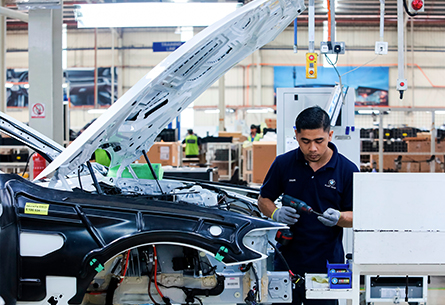Indeed, there will be no trauma in operations. We aim to have a complete system that benefits all foreign trade as soon as possible.
Colombian products with 0% tariff
- 99% of Colombian qualifying industrial and textile goods will become duty free upon the implementation of the FTA.
- 89% of Colombian agricultural goods will become duty free upon implementation of the FTA.
- Duties on many other tariff lines will be phased out over a period of up to 15 years, with some agricultural tariff rate quotas. While Colombia is expected to fill its new sugar TRQ, the FTA is likely to have a minor effect on U.S. imports and production of sugar and sugar containing products.

Key facts
The Colombia- U.S. FTA promotes trade in goods by eliminating tariff barriers, and by promoting the harmonization of technical regulations between both parties. As a result, FTA supports economic growth in both countries.
The FTA supports American jobs and improves American competitiveness since many American businesses use imports under this program as inputs to manufacture goods in the United States.
It is expected that the agreement will be effective in the second half of 2012, once Colombia accomplish all the agreement laws, regulations and policies. USTR is helping to accomplish these requirements as quickly as possible.
Colombia’s government is ensuring labor laws by promoting more protection rights for workers, to please and accomplish the strategic goals of the bilateral Labor Action Plan.
The USTR General Counsel, Tim Reif said that the FTA with Colombia is “well on the road” and is likely to be the next FTA to see implementation -GBD event on the pending FTAs.
United States Trade Representative Ron Kirk said “USTR has already started the work necessary to bring these agreements into force as soon as possible”- September 2011.
Colombia asked assistance in its labor to upgrade its workers rights from both the International Labor Organization and U.S. government. Mr. Kirk said:“It feels like they are absolutely meeting both the letter and spirit of what we asked them to do”.
Colombian products with 0% tariff
ATPDEA
The approval of the FTA extends the Andean Trade Promotion and Drug Eradication Act, ATPDEA, which was renewed until July 2013. The tariff preferences that many Colombian products have had shall be maintained with the FTA and therefore, sectors such as flowers, apparel, tobacco, cocoa, plastics and leather manufacturing, among others, shall be benefited.
In fact, both the ATPDEA preferences as well as the others that were agreed upon, shall be maintained over time, given that their persistence shall not be subject to unilateral U.S. Government and Congress decisions.
Agreements texts
The FTA is an agreement that generates opportunities for all Colombians, as it contributes to the creation of quality jobs and the improvement of the national economy’s performance. It benefits the exports sector, which will be able to sell its products and services under favorable conditions in the U.S. market.
The subjects that were negotiated were market access, in its two aspects (industrial and agricultural), intellectual property, investment regime, Government acquisitions, conflict resolution, competency, e-trade, services, environment and labor, among others.
The text of the agreement is embodied in one preamble and 23 chapters. The chapters cover aspects that reflect the general agreed-upon disciplines, many of which are common in multilateral and bilateral negotiations, and incorporate particular elements obtained by Colombia as well as by the United States in the negotiation.
For more details on the agreement, visit the Ministry of Trade, Industry and Tourism website at: http://www.tlc.gov.co/
FAQs about TLC
With the adjustment being advanced, the system will track how much has entered for a given quota, by consolidating this information in real time.
The National Government has been working at full speed for this information system to be ready as soon as possible.
For technology, such as computers, televisions, tablets, cell phones, semiconductors, and scientific equipment, Colombia adhered to the Agreement on Information Technology of the World Trade Organization. This obligates parties to give relief to these products.
The FTA gives immediate relief for stationery items, such as pencils, crayons, specialized brushes, equipment for personal care, beauty products, such as irons and curling irons, as well as toys, video equipment, musical instruments, clocks and alarms, cosmetics, and perfumes.
Considering that approximately four thousand products may be imported from the U.S. market duty free, including raw materials, machinery, equipment, agricultural products and manufactured goods, it is understood that this will have a favorable impact on the pocketbooks of Colombians, overall.
No, in the field of drug-related intellectual property (patents and test data), Colombia maintained its current standard of protection, without creating new barriers to access to medicines. It also preserved all the flexible instruments it has to govern the defense public health.
The FTA incorporated the protection of biodiversity and the traditional knowledge associated with it. This is recognized under international principles of prior informed knowledge and equitable sharing of benefits for the use of genetic resources, as required by our legislation. In addition, mechanisms were incorporated that are devoted to avoiding the improper granting of patents that deal with biodiversity, mainly through the exchange of information. The parties agreed to seek ways to share information that may have bearing on the patentability of inventions based on traditional knowledge or genetic resources.
No, this topic provides conditions for an adequate and effective protection of intellectual property rights. Also, a proper balance achieved between encouraging and protecting knowledge generation and research with that of providing adequate access to technology and knowledge. In general, the negotiation preserved the current regulations in the country and incorporated national issues, such as measures to prevent biopiracy, along with the promotion of innovation and technological development.
On this point, various themes were negotiated to help the competitiveness of the companies in this sector. To this end, Colombia will have no obligation to privatize telecom companies owned by the central government. In terms of private networks, the chapter ensures that companies of the parties can access and use public networks and services for telecommunications, including leased circuits offered in the territory or across borders, in terms reasonable and nondiscriminatory conditions. It highlights the requirement of commercial presence by Colombia, in providing public telecommunications services, which, in addition to attracting foreign investment, guarantees equal treatment, in terms of regulatory burdens and contributions to the Communications Fund. Similarly, we obtained the exclusion of rural telephony in the disciplines of the FTA. This service includes populations with fewer than 4,500 lines installed, which is 74% of the municipalities in Colombia.







